Students and communities benefit from the college’s strong relationship with the CDC’s Epidemic Intelligence Service program

Dr. Kate Ellingson has mentored several of the college’s PhD graduates who have earned selection with the Epidemic Intelligence Service program, offered by the Centers for Disease Control, designed to train young epidemiologists in disease detection and prevention through on-the-ground field experience, and the college continues to build our relationship with the program.
Photo above, left to right: Kate Ellingson, Sana Khan, Cedar Mitchell, Valerie Madera Garcia
The collaborative relationship between the Mel and Enid Zuckerman College of Public Health (MEZCOPH) and the Epidemic Intelligence Service (EIS) program at the Centers for Disease Control and Prevention (CDC) has delivered lasting benefits for our PhD graduates, our students, and our communities in Pima County.

The Epidemic Intelligence Service provides outstanding real-world training. I’m proud of our MEZCOPH PhD graduates who have gone on to become EIS Officers.
Dr. Kate Ellingson

A globally recognized two-year postdoctoral program that equips early career health professionals with on-the-job training in field epidemiology, EIS gives recent graduates the frontline experience needed to work effectively as epidemiologists within local, state, national, and international public health systems. Often called “disease detectives,” EIS Officers (EISOs) engage in critical public health response activities locally and throughout the world.
Associate Professor and EIS alum Kate Ellingson, PhD, has encouraged interested PhD students to apply for the EIS. As EISOs, our graduates have sharpened their skills on the frontlines of outbreaks, emergency responses, and innovative analyses to support public health recommendations. Dr. Ellingson also works with local health officials to supervise EIS officers (EISOs) who have been placed with the Pima County Health Department (PCHD). The EISOs at PCHD collaborate with faculty and students in our college on local public health response activities. These collaborations create internship and partnership opportunities for MEZCOPH students and expose them to the EIS program.
“The Epidemic Intelligence Service provides outstanding real-world training,” said Dr. Ellingson, “I’m proud of our MEZCOPH PhD grads who have gone on to become EIS Officers. At the same time, I’m grateful to partner with state and local health leaders to supervise EIS Officers who have been placed with Pima County Health Department. These officers have worked on exciting projects with our MEZCOPH students while they improve health outcomes in our region. It’s a relationship that benefits students, benefits the community, and prepares the next generation of health professionals.”
MEZCOPH Graduates Train with the Epidemic Intelligence Service
Several of our doctoral graduates, including David Bui, Valerie Madera Garcia, and Sana Khan, have joined the EIS in the past five years and the experience has launched their careers in epidemiology and public service.
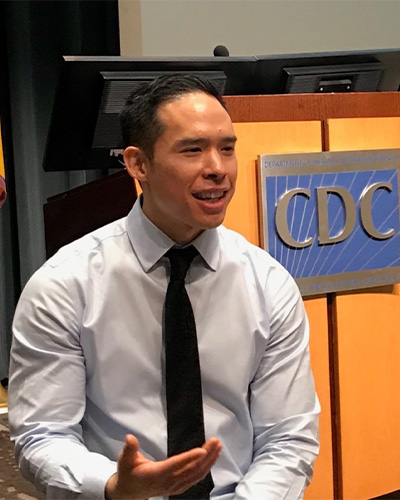
David Bui presenting at CDC’s Tuesday morning seminar, frequently attended by senior CDC and HHS health officials.
David Bui
PhD Epidemiology and Biostatistics
David Bui earned his PhD at MEZCOPH in 2018 and joined EIS the following summer, working at the National Center for Environmental Health. Throughout his time at the CDC, David played a pivotal role in several high-stakes public health responses. He investigated the health effects of a pipeline explosion on first responders in rural Kentucky, traced the cause of a mysterious non-viral hepatitis outbreak in Nevada, coordinated serosurveys in Puerto Rico, and responded to COVID-19 outbreaks in New York nursing homes during the city's first lockdown. The expertise and resilience he developed through these experiences proved invaluable when he transitioned to the California Department of Public Health, where he was entrusted with leading the epidemiology response team for the Mpox outbreak in 2022.
Reflecting on his journey, David credits MEZCOPH’s epidemiology and biostatistics program for providing the technical foundation that prepared him for the challenges of EIS. However, he emphasizes that EIS taught him the critical importance of the round-the-clock, interdisciplinary team effort across local, state, and national levels to safeguard public health.
"The essence of EIS training," he says, "is being tossed into new and complex situations, learning to collaborate within a team to identify where and how you can contribute, and working together to achieve sometimes uncertain or evolving goals. To this day, I carry that training with me into every project I undertake, and it has never let me down."

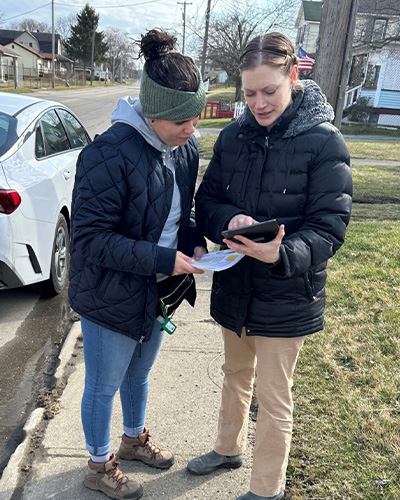
EISOs Valerie Madera-Garcia (left) and Emily Faherty (right) conducting door-to-door canvasing in East Palestine, Ohio.
Valerie Madera Garcia
PhD Epidemiology
Dr. Madera Garcia graduated from the college with a PhD in Epidemiology in Spring 2022 and joined the Epidemic Intelligence Service program that summer. She was placed in the Behavioral and Clinical Surveillance Branch at the Division of HIV Prevention in Atlanta, Georgia. During her first year, Dr. Madera Garcia was deployed to the National MPOX Response, where she served as the lead of the MPOX Vaccine Equity Pilot Program.
In 2023, she was deployed to respond to a train derailment in East Palestine, Ohio and Darlington Township, PA, where she served as the lead data analyst assessing post-emergency chemical exposure. Valerie credits this experience with building her capacity to handle public health crises. She had to communicate data every day, which provided valuable on-the-ground training in working with local, state, and federal health officials in high-intensity situations. Later that year, she investigated an HIV cluster in Alaska, where she designed and conducted qualitative analyses to assess barriers and facilitators to prevention and treatment. After completing her EIS fellowship in June 2024, she accepted a position as an epidemiologist at the CDC’s Agency for Toxic Substances and Disease Registry.
“As an EIS officer, I had the opportunity to work with interdisciplinary teams within CDC and across other federal agencies during emergency responses and field investigations. In my case, those investigations helped me secure my new job within the agency. The EIS experience was one-of-a-kind and helped me build a strong foundation for my epidemiology career.”

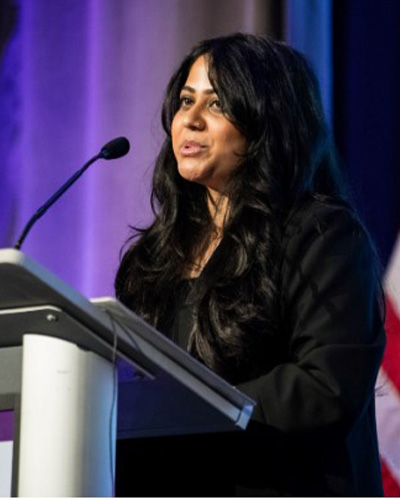
Sana Khan presenting at the EIS Conference 2024.
Sana Khan
PhD Epidemiology
A recent PhD graduate in Epidemiology, Dr. Khan earned her degree in Spring 2023 and then joined the Epidemic Intelligence Service program that summer. She is currently stationed at the health department in Alameda County, California. As her first assignment, Sana led an investigation of healthcare-associated bloodstream infections involving a rare pathogen at an acute care hospital. She credits this experience with teaching her to work closely with state and federal health officials and how to best utilize laboratory methods to conduct environmental sampling.
As a longer-term project, she is investigating the rise of congenital syphilis cases in Alameda County. She is also working with long-term care facilities throughout the state to strengthen antimicrobial stewardship programs. Based on the strength of the bloodstream infection investigation, she had the honor of being the opening presenter at the 2024 EIS conference. Her EIS experience has reinforced her commitment to a career in epidemiology as a way to serve communities and advance science.
“EIS has taught me how to use the applied epidemiology skills I learned at MEZCOPH and has provided me with a great foundation to continue to serve my community. I am eternally grateful for the education I received at MEZCOPH which helps me every day in my fellowship.”
EIS Officers placed in the Pima County Health Department work with MEZCOPH students and faculty
The college’s connection with the Epidemic Intelligence Service goes beyond guiding our PhD graduates to apply for the EIS program. EIS Officers have been placed to work with Pima County Health Department (PCHD), and because of the connection with MEZCOPH faculty member Dr. Kate Ellingson, the college often collaborates on investigations and research with the EIS Officer at PCHD.
Recently, EIS Officer Dr. Cedar Mitchell was placed with the PCHD and concurrently joined MEZCOPH as postdoctoral associate. Dr. Ellingson served as one of Cedar’s EIS supervisors, and facilitated her integration into the lab, where they worked with MEZCOPH graduate students on analytic projects and outbreak investigations. This collaboration familiarized our MEZCOPH students with the EIS training program, trained them on real-world public health challenges, and helped create a pipeline for them to become future EISOs and public health leaders.
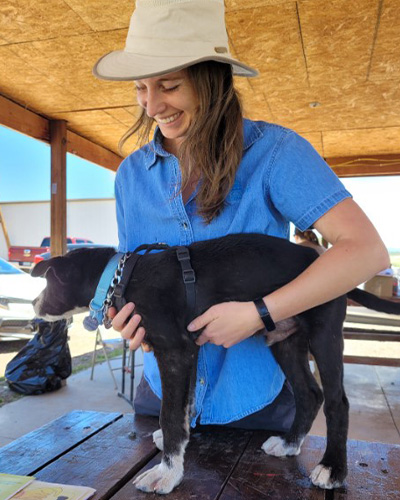
Cedar Mitchell at the Healthy Companions One Health Clinic.
Cedar Mitchell
PhD Epidemiology
An Epidemic Intelligence Service Officer who served in Pima County Health Department (PCHD) from 2022 to 2024, Dr. Mitchell now works for the CDC as a Career Epidemiology Field Officer in Montana.
While serving as an EIS officer at PCHD, Cedar led investigations of a fatal botulism case in Tucson, an outbreak at Pima Animal Care Center, rattlesnake bite surveillance in Arizona, a case series on malaria among recent migrants crossing the Mexican border, and syphilis screening. She also supported a West Nile Virus study of long-term impact on Arizonans. Additionally, Cedar collaborated with partners across the county to the launch Tucson’s first Healthy Companions clinic to serve housing-unstable populations and their pets simultaneously through mobile health clinics. For this project, she mentored MPH interns and invited other graduate students from MEZCOPH to volunteer.
As her analytic project for EIS, Cedar worked with students from Dr. Ellingson’s lab to analyze blood levels of PFAS among Arizona frontline workers enrolled in the CDC-funded AZ-HEROES study led by MEZCOPH and UA Health Sciences faculty. Her diverse and extensive contributions during her two years with PCHD made a significant impact on public health in Southern Arizona and on MEZCOPH graduate students.
“Through these experiences in the field and working with diverse partners in public health, my EIS training prepared me for my current position as a field epidemiologist in Montana. Learning about how to lead investigations, and perhaps more importantly, how to build supportive collaborations and engage with other partners in public health, are skills that will be incredibly useful throughout my career in public health!”
Dr. Kate Ellingson builds the connection with the Epidemic Intelligence Service
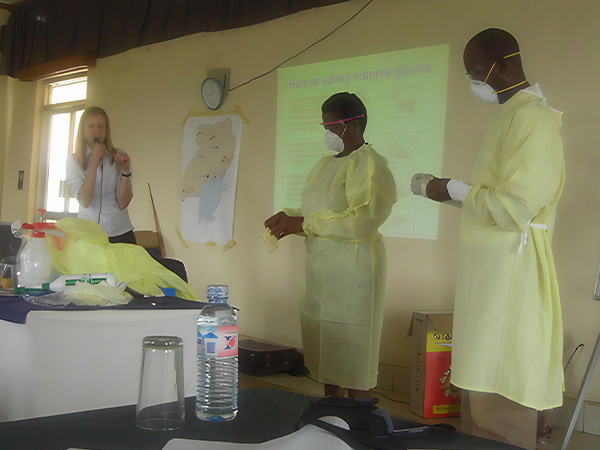
Kate Ellingson as an EIS Officer in 2008, developing local trainings with healthcare workers in Uganda during an Ebola outbreak deployment
Kate Ellingson, associate professor in epidemiology and biostatistics at the college, served as an EIS Officer from 2006 to 2008 in the Division of Healthcare Quality Promotion soon after earning her PhD in Epidemiology. After continuing her career at CDC and the Oregon Health Dept for 10 years, she joined MEZCOPH as a faculty member and began introducing EIS to her student mentees. In 2021, Kate joined forces with Theresa Cullen, MD, MS, director of PCHD, and Ken Komatsu, MPH, the state epidemiologist at the Arizona Department of Health Services, to secure an EIS officer position for the Pima County Health Department.
In 2022, PCHD was assigned their first EIS officer, Dr. Cedar Mitchell, who holds a PhD in Epidemiology from UNC. Dr. Cullen and Dr. Lindsay Kohler (MEZCOPH alumna and current Director of Epidemiology at PCHD) jointly supervised Dr. Mitchell at PCHD with Dr. Ellingson as a secondary supervisor. In Summer 2024, Dr. Annie Wang, a recent PhD-DVM graduate from North Carolina State, joined PCHD as the new EISO. She will join Dr. Ellingson’s lab this fall and hopes to work on epidemiology and One Health projects with MEZCOPH students.
Dr. Ellingson remembers her rewarding EIS experience:
“Every field assignment required multidisciplinary expertise – I found working in teams rewarding and I learned so much from my colleagues in different disciplines by working long days and late nights in the field. I had the opportunity to work with so many amazing people at CDC, in various state health departments, in country offices throughout the world, and out in the community. My EIS classmates are some of my closest friends to this day – you bond for life in a program like EIS.”
Conclusion
The relationship between MEZCOPH and the EIS program enriches the training and career prospects of MEZCOPH students while contributing to the advancement of public health. We are confident that this innovative collaboration will continue to yield transformative results, shaping the future of public health and empowering the next generation of leaders!

